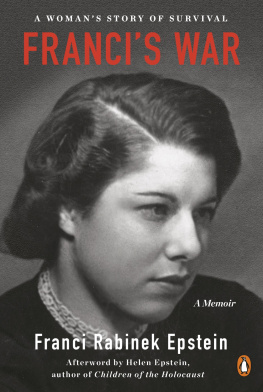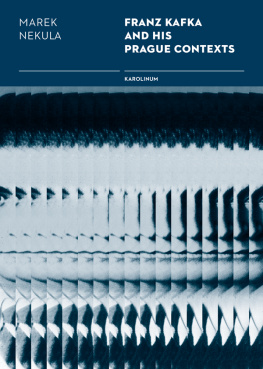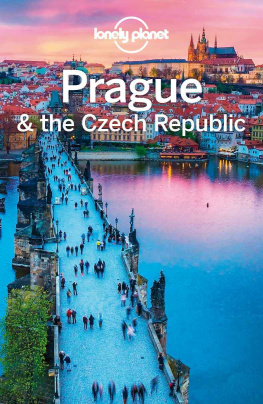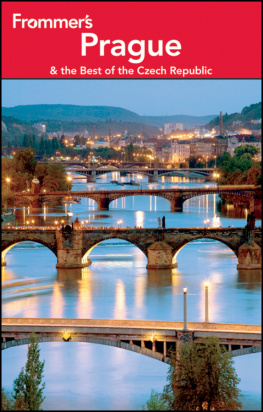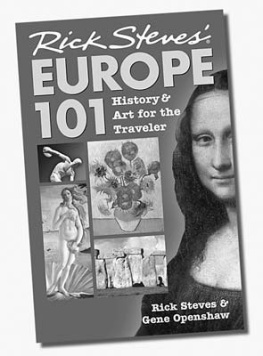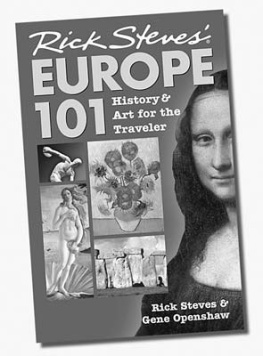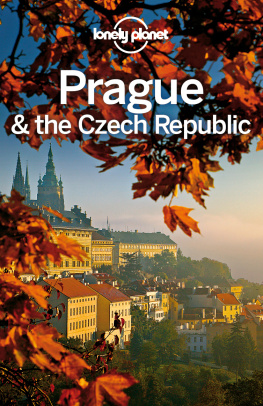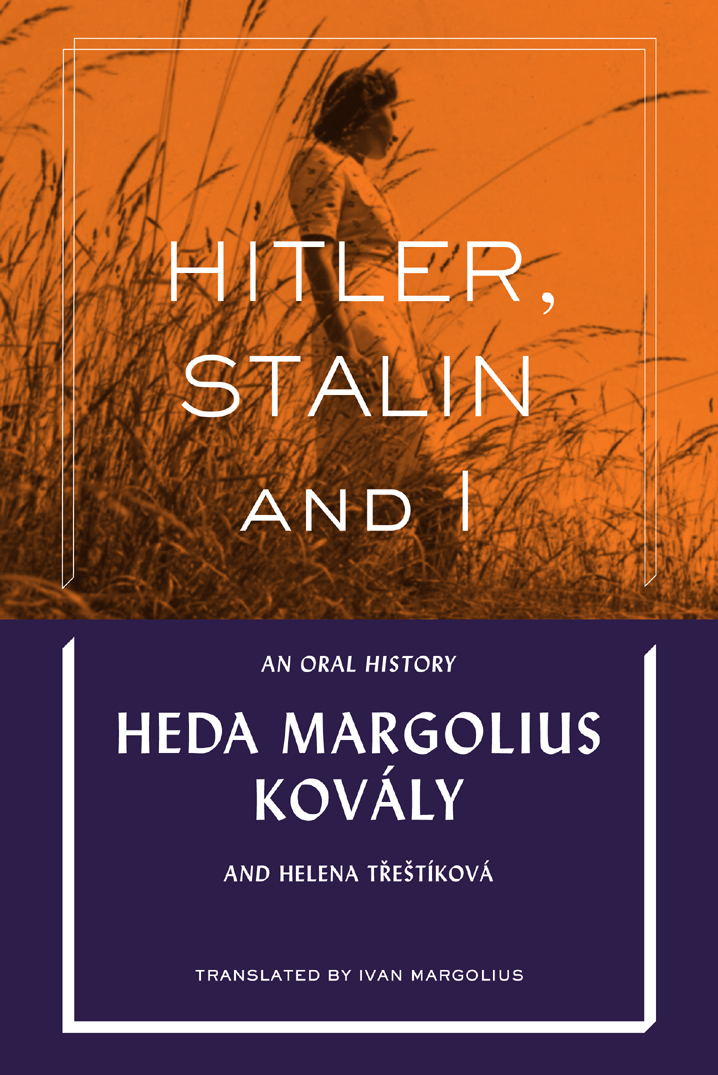

Hitler, Stalin and I: An Oral History
By Heda Margolius Kovly and Helena Tetkov
Prepared for publication and translated from the Czech by Ivan Margolius
Edited by Carrie Paterson and Christopher Michno
Text Heda Margolius Kovly and heirs, 2018
Translation Ivan Margolius, 2018
Images courtesy of Ivan Margolius / Margolius Family Archive, except where noted. Images courtesy of esk televize are from the documentary Hitler, Stalin a j, directed by Helena Tetkov and produced by esk televize, 2001.
Hitler, Stalin a j was published in Czech by Mlad fronta, Praha, 2015,
This book is an adapted film transcript of an interview with Heda Margolius Kovly by Helena Tetkov. The interview took place in Hedas apartment on Soukenick in Prague between August 28th and August 31st, 2000, and formed the basis of Hitler, Stalin a j, a documentary directed by Helena Tetkov and produced by esk televize in 2001.
Cover and book design: Jessica Fleischmann / still room
Typesetting: Jody Zellen
Publishers Cataloging-in-Publication data
Names: Kovly, Heda, 1919-2010, author. | Tetkov, Helena, author. | Margolius, Ivan, translator.
Title: Hitler, Stalin and I: an oral history / by Heda Margolius Kovly and Helena Tetkov; translation by Ivan Margolius; introduction by Helena Tetkov and Ivan Margolius.
Description: Los Angeles, CA: Dopplehouse Press, 2018.
Identifiers: ISBN 9780997818499 (ebook) | LCCN 2017946125
Subjects: LCSH Kovly, Heda, 1919-2010. | Czechoslovakia--History--1918-1938. | Czechoslovakia--History--1938-1945. | Czechoslovakia--History--1945-1992. | Komunistick strana eskoslovenska--Purges. | Jews--Czech Republic--Prague--Biography. | Antisemitism--Czech Republic. | Czechoslovakia--Politics and government. | Prague (Czech Republic)--Biography. | Auschwitz (Concentration camp) | World War, 1939-1945--Personal narratives, Czechoslovakian | Trials (Political crimes and offenses)--Czechoslovakia. | Slnsk, Rudolf--Trials, litigation, etc. | BISAC BIOGRAPHY & AUTOBIOGRAPHY / Historical | BIOGRAPHY & AUTOBIOGRAPHY / Personal Memoirs
Classification: LCC DB2629 .K68 2018| DDC 943.7/1204/092--dc23

Los Angeles, California
Dedicated to Hedas grandchildren and great grandchildren
as she would have undoubtedly wished
(Daniel, Susanna, Theo, Jan, Elli, Matthew, Luna, Toby)
CONTENTS
Table of Contents
Guide
HELENA TETKOV

I first became acquainted with Heda Margolius Kovly during the screening of Zuzana Justmans documentary, A Trial in Prague (2000), at Pragues Evald Cinema. Straight away Heda enchanted me in that film with her extraordinarily direct and open minded presence. Immediately I had an idea to make a documentary film with her about her life, which was so horrendously typical of twentieth-century Central Europe, where there was no escape from global political events. Several days later I contacted her and appealed for her participation. Heda hesitated a while, but to my delight, she agreed to the proposed project.
The days I spent with her and my small crew working on that film were some of the greatest experiences of my life. Heda had an enormous talent for expressing herself openly to the outside world. She spoke with precision and was descriptive and witty in places which in relation to the subject matter is especially rare. I admired her attitude and composure, even after all her extremely difficult experiences. Nazism and Communism, the two totalitarian regimes that passed through Central Europe in the twentieth century, afflicted Hedas life directly with maximum intensity. Nevertheless, she remained an optimist, and for that I respected her greatly.
We shot the film in 2000 and edited it in 2001. The final editing was carried out at the Czech Television studios in September 2001. We were working on including documentary footage of the Warsaw Pact invasion of Czechoslovakia in 1968. On the monitor we had shots of blazing buildings and smoke over Prague. We took a short break, and my film editor and I went to get coffee. A television set in the caf was switched on, showing the burning towers of the World Trade Center in New York. It was September 11, 2001. I realized then that our film was very timely. Subsequent to the following world events, I feel that Hedas story still remains very topical.
Prague, 2016
IVAN MARGOLIUS

My mother, Heda Margolius Kovly (ne Bloch), was born in Prague in 1919. She spent the years of the Second World War in a ghetto, Auschwitz and other concentration camps, escaped from a death march, and took part in the Prague Uprising against the Nazis in May 1945. Following the war she worked as a graphic artist at various Prague publishing houses. In 1952 her first husband and my father, Rudolf Margolius, was convicted in the Stalinist Slnsk Trial and executed. In 1955 she married Pavel Kovly. In 1968 after the brutal crushing of the Prague Spring, Heda was forced into exile in the United States. Heda returned to Prague in 1996, and she lived there until her death in 2010.
After accidently finding the transcript of the Slnsk Trial buried deep in a drawer at home as a schoolboy living in Prague in 1961, I had to wait another two years for Heda to gather the courage to tell me in detail of my fathers fate. (Only very recently have I steeled myself to listen to the actual sound recording of Rudolfs trial deposition, which differs from the prewritten text that he was forced to memorize and from the later published transcript.) I begged Heda to write the whole story down, if not for the general readership then at least for me, the future generations of our family, and our remaining distant relatives. This has also served as a measure of resistance to official narratives, as I will briefly explain. In 1963 the Communist government of Czechoslovakia published its findings into the Slnsk Trial and the innocent men accused and executed, my father among them. But the assessment was distributed only to select members of the Party, not into general circulation because of worries about possible backlash. Since then, the trial has been written about in various books, but there has neither been an official declaration of innocence nor an apology by subsequent governments. My own efforts to seek a posthumous apology for my father had been thwarted even by the governments democratically elected since November 1989. Neither Presidents Vclav Havel, Vclav Klaus nor Milo Zeman apologized to the defendants families, their excuses being to the effect of: Apology can only be given by those who were guilty in construing the Trial. This is of course an outrageous and unacceptable denial of responsibility, especially today when it is more than common for governments to publicly apologize to families and survivors of prior governments misdeeds. In 1968, First Secretary of the Communist Party Alexander Dubek and President Ludvk Svoboda gave medals in memoriam to some of those executed, including to my father Rudolf Margolius, but the case was never fully explained to the general public.


